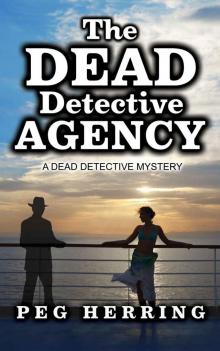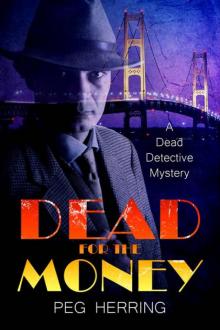- Home
- Peg Herring
The Dead Detective Agency (The Dead Detective Mysteries) Page 8
The Dead Detective Agency (The Dead Detective Mysteries) Read online
Page 8
They walked together back to the PLK parking lot and parted at their cars, although Carmon could almost hear Tori berating her. “You’ve got to give a man a chance,” Tori would have said. “He won’t ask again if you don’t give him some sign you’ve enjoyed his company.” Still, beyond a “thank you” that sounded prim even to her own ears, Carmon could think of nothing to say.
Spending time with Abe had helped her to feel a little bit better. He was attractive and sensitive, and it seemed his intention had truly been to take her mind off the death of her friend. Remembering his earlier manner toward Jennise, Carmon reminded herself to be careful. How easily he had switched between coldness and charm. What would Tori have said if she had seen Abe’s other side?
Chapter Thirteen
Come and Dine
Dinner was, to say the least, unusual. The fact she was dining with dead people would not leave Tori’s mind. A day’s time had brought acceptance for most. The atmosphere was relaxed, soft music played in the background, and an efficient wait staff served a sumptuous meal. Women in gowns that highlighted their individual attractions, a tribute to Mr. Li’s discernment, sat interspersed with men in dignified tuxes, chatting amiably. Conversation at Tori’s table was a little forced at first, but as good food and the elegant ambiance relaxed the diners, it became more interesting.
The main topic was their situation. Realizing they were all “in the same boat” as one wag phrased it, most were anxious to compare experiences. Each was fascinated by his own death, although emotions differed. A girl on Tori’s left, inclined to simpering, was all breathless anticipation.
“It’s amazing,” she exclaimed, her straight, ash-blond hair rippling like a silken curtain along her face. “I can’t wait to see what’s next!”
A shy young man on her other side seemed frozen with apprehension. “But the accounting,” he said with a shiver. “We have to face that first.” His serious eyes moved from one person at the table to another, haunted by unspoken doubt. What could he have done that merited so much fear?
“It may not be as bad as you think,” soothed a man who’d obviously had more time to ponder the possibilities. His relaxed, almost relieved, manner made Tori suspect death had delivered him from something he considered worse.
“‘All is written in the Book of Life,’” the young man said gloomily, pushing aside a perfectly prepared filet of sole untasted.
Others around the table shared their theories. Most were resigned, especially the older ones who’d over time accepted there was an end to life. Some were grateful. Life had become a trial in the bodies they had inhabited, although those bodies moved about well enough now. Even a young woman who confided she’d died in a house fire looked fine. Tori reminded herself they had been given physical bodies “of a sort” to help adjust to the fact of their deaths.
The meal ended, and the music took on dance rhythms. Mike circled the room, chatting at each table for a few minutes. Heavenly Host popped into Tori’s mind. Still, his care for each person there was apparent, and his presence seemed to have the same calming effect on others that Tori felt.
To her surprise, when she left the dining hall to stand for a while on the deck, Mike joined her at the railing. “Not too bad.” He gazed into the distance. “We have only a few who aren’t handling it well.”
“The nervous young man at my table?”
“Phillip, yes.” Mike frowned. “He’s been steeped in Original Sin teaching until he’s sure he can’t possibly go on. Nancy will spend extra time with him tomorrow, and I’ll watch him tonight.”
Tori raised her eyebrows. “What could he do?”
“This really is a ship in many ways,” Mike answered soberly. “Some throw themselves overboard rather than face what’s ahead.”
“And what happens then?”
Mike’s face turned grim as he gripped the railing with both hands. “We lose them and whatever they’ve achieved.”
“They’re like the damned, then? Just gone?”
“It’s sad. They wouldn’t be here if they had no worth.”
Tori felt a shiver of dread as her agile mind moved forward to a logical conclusion. “Why are you here with me if you’re keeping watch over the doubtful ones?”
Mike smiled at her quickness but didn’t avoid the question. “You’re also a special case, Tori, though not in that sense. Murder is traumatic, as you well know. The soul is unprepared for death, shocked by the notion that someone killed the body it inhabits.”
She nodded, recalling the waves of anger and despair that had assailed her all afternoon.
“Worst, I think, is a case like yours.”
“Really?” She wondered if she should be intrigued or offended.
Mike’s eyes clouded and he turned away from the horizon, leaning his back against the railing. “A woman is murdered by her husband. It’s a terrible shock but conceivable: he wants freedom, he has a lover. Nothing excuses the act, but the soul understands.”
“But I’ve heard rumors of souls that can’t rest because their deaths are unavenged.”
“It’s not the avenging that keeps a person from going on.” Mike touched her hand briefly, his fingers oddly cool yet comforting just the same. “It’s understanding why. A pedestrian hit by a car knows why he died, accepts the workings of the world he once inhabited. You, on the other hand, know you died, but you don’t know why.”
A bullet is why, she thought. But she knew what Mike meant. Why had someone shot her? What had she done? “Is that why I feel doubtful about going on?”
“Answering the final ‘Why?’ allows a person to truly rest in peace. Murder victims with no idea as to whom or why often have difficulty with the crossing.”
“So we’re problem children?” Tori tried to make her voice light. “The ones who slide overboard at night when they can’t face the questions anymore?”
“We hope not,” Mike answered. “But some can’t let it go.” He glanced sideways at her from under long, almost feminine lashes. “They become Portalists, unable to give up the self some other person wanted destroyed.”
“So they wait, but for what?”
“Resolution. Some understanding of why it happened.”
Tori turned away from the horizon and joined Mike in facing backward, the rail at her back as well. “Nancy told me there are people who can find out the truth.”
“Yes, if that’s what you want. But you need to think about it carefully. It’s not the easiest route to take.”
“Why not?
“Because what you discover could be more painful than you think. What if your murderer was a relative or your best friend? Statistically that’s likely, you know.”
Her instincts said no. No one she loved had done this to her.
She shifted her body slightly away, folding her arms in mute disagreement. Mike smiled to let her know he didn’t insist on being right. “I wanted to make things clear. Whatever you do is okay, but sleep on the decision.”
“Thank you.” Tori doubted she’d sleep at all. Comforting as Mike’s presence might be, as soon as he left her, the doubts would set in again. The bed might be soft and the room quiet, but it was not okay to be murdered at twenty-five, it was not okay to leave behind a life, even as simple as hers had been, without some closure to it, some understanding of why it was ended. She didn’t want to go on to anything else, no matter how wonderful, without answering the questions of the past. Tori hoped Mike meant it when he said any decision would be okay, because she was pretty certain of the path she wanted to take.
Chapter Fourteen
Poor Judd is Dead
“Found your shooter,” Jaime informed Madison when he arrived on Tuesday morning. Although it was only 8:15, Jaime had already broken off a chunk of a Hershey bar, and he moved the remainder from a folder and handed the report to his partner. “Good news: we’ve got a great case against him.”
“And the bad news?” Madison asked, knowing Jaime’s method of delivering inf
ormation.
“He’s dead. Overdosed in an alley not ten blocks from the victim’s residence.”
“Damn,” Madison growled. “More unanswered questions.”
The corpse was one Llewellyn J. Simms, known as “Judge,” either because he’d gone by his middle name, Judd, most of his life, or because he’d faced so many judges in the twenty-two year span.
Examining Judd Simms’ weighty file, Madison got a preliminary idea of the man’s character. Not much to put on a resume. He’d been in trouble since age fourteen, probably before that if they wanted to dig. Beginning with drug possession and moving to sales, he mixed in some violent episodes as his own habit grew: armed robbery, B&E, even a car-jacking one cold February night. It was very possible that young Judd, in his constantly drugged state, could take the final step to murder. But the capacity to kill didn’t explain his choice of victim. Judd had committed crimes for money because money bought drugs. Madison suspected this one was no different.
Hoping to find some clue in the addict’s death, he went to find and badger Parks, the M.E., for an ASAP autopsy. Characteristically ornery, Parks reminded Madison he had other jobs to attend to. “I’ll give you what I know now, and you’ll have to wait for the rest, like a good little policeman.”
A misanthrope who preferred to spend his time with the dead, Parks liked Madison as well as he liked anyone, but it was hard to tell. He slid plastic-framed glasses, paint-specked for as long as anyone could remember, back into place in a useless gesture, since they immediately slid back down to where it seemed impossible to see through them or over them. “Definitely an overdose. Guy had enough heroin in him to kill ten his size.”
“Wonder where he got such a big score,” Madison mused.
“Don’t they always find a way?” Parks stuck a finger into a half-filled cup of coffee to test its warmth, gave no indication of whether he was pleased with the result, but took a large gulp.
“Judd didn’t rob the woman he shot. He called his half-sister two days ago with a story about needing money to get clothes for a job interview. She didn’t buy it. Been had before.”
Parks wasn’t interested. Unlike fictional M.E.’s, he concentrated on forensics and let the police figure out the rest. “I’ll call when I’ve got the lurid details.”
Madison returned to find Jaime on the phone with a detective in Muskegon, a city fifty miles to the northwest. He handed the phone to his partner. “This guy’s interested in PLK Investments.” Jaime munched M&M’s as he listened in. Green ones first, as always.
After Madison gave his reason for visiting the firm that morning, the detective, one Sam Yates, explained his interest. “We had an apparent accident here in Muskegon last week, guy named Allan Cartwright. He fell down the stairs at his home. I’d like to know for sure how that happened.”
“Like maybe he was pushed?”
“All possibilities considered. Cartwright had the number for this PLK Investments on a memo pad. Next to it he wrote, ‘Where am I?’ When I called the firm, they told me he’d closed his account some time ago.”
“A mistake?”
“Could be. But he died before he could correct it.” Yates paused. “So you’ve got a murder victim who worked at PLK?”
“Apparently a random shooting by a user-loser.”
Another pause. Yates said, “Maybe we should both look again?”
“Two people dead. It’s worth a few questions.”
“I’ll see what I can find out and call you back.”
“Thanks.” Madison pushed the disconnect button and immediately called PLK. When the receptionist, Yvonne, didn’t recognize the name Cartwright, he tried it on Jennise.
“I told the other officer, Mr. Cartwright’s file was closed several months ago,” she said in a tone that sounded overly emphatic. Madison held the phone away from his ear with a grimace as her bleating voice continued. “The old man had forgotten he switched firms. Older people sometimes move their money, afraid they won’t have enough when they need it. Big firms advertise wonderful returns, and little firms like ours lose out. Clients seldom do better. They just end up paying lots of rollover fees.”
“But most people know who they’re invested with and who they aren’t. He wrote ‘Where am I?’ by your number.”
“It’s nothing to do with PLK, and you’ve got a local crime to investigate,” she said dismissively. “Have you checked the halfway houses? That man who killed Tori might have bragged to his druggie friends about his crime.”
Was she anxious to turn his attention elsewhere? Madison cautioned himself not to let his dislike of Jennise Bowdlin color his perceptions. He managed not to say he knew how to do his job, managed to get away before she started again on what a tragedy it was. Assuring Jennise that everything possible was being done to explain “that sweet girl’s” murder, he hung up and sat on the edge of Jaime’s expensive desk, the phone still in his hand. “Let’s see if we can get a look at the personal accounts of the people at PLK.”
“You think someone at the company hired Judd?”
“Maybe.” He quickly explained his feeling Jennise didn’t want him to pursue the question of Allan Cartwright’s note. “PLK is run by an old man, Amos Pollard, who doesn’t show up for work very often these days and might be losing his edge. This office manager is out for herself, a client named Cartwright who didn’t know he was no longer with the firm is dead, and there’s a guy named Gougeon who acts funny. Maybe Tori found out something was screwy, tried blackmail, and somebody hired old Judge to shut her up.”
Jaime slammed his drawer-footrest closed and swiveled his chair toward the front. “But everybody said what a nice girl she was.”
“Everybody thought Lizzie Borden was a nice girl, too,” Madison told his partner with a grin, “but I think she axed her parents.”
Following Judd Simms’ trail, Madison and DeMestrie ended up at Martin’s, a bar downtown that catered to the office crowd. The bartender was tattooed, pierced, and dyed, and Madison wondered how much you have to hate yourself to go to those extremes. The man was friendly and helpful, though, his behavior surprisingly normal. He assured them that PLK people came to Martin’s often, and he recognized Tori’s picture right away. “Nice girl,” he said when told the reason for the investigation. “Why is it always the nice ones that don’t make it?”
A picture of Judd Simms brought a different response. “Him I can describe in two words: Lo-ser. We tried to keep him out of here.” The man set a glass down on the dry rack with emphasis. “He knew better than to step foot in the door if I was on duty. Some might have let him stay if he behaved, but I hate his type.”
Madison explained that Judd was also dead. This time there was no regret in the bartender’s expression.
“Who did Judd hang with?”
“Let’s see. There was a time when he was allowed in here, so he knew some of the regulars.”
“People from PLK?”
“Yeah, they come in here a lot after work to relax.”
“And Judd mingled with them?”
The man ran his tongue stud over his teeth, making a clicking sound that turned Madison’s stomach. “Not really mingled, kind of hung on the edges, y’ know? He’d sit at the bar and watch sports with them. A few times I saw him playing pool with the PLK guys.” He grinned. “I remember he was all mad once when Abe beat him bad five games in a row. Abe is a shark, and nobody bothered to warn Judd.”
Madison leaned a fraction closer. “Abe Gougeon?”
“Right. A real artist with a cue.”
“So Abe knew Judd?”
“Like I said, Simms was always in here. Then I found out he was supplying some of the neckties with cocaine, and I booted his ass out for good.”
“Any idea who was buying?”
“I never heard for sure, but I’m pretty sure one was this Daryl Somebody. Worked at PLK, but he was kinda sleazy. I never liked the guy. He moved or something. Haven’t seen him in a while.”
“Would Tori Van Camp have known Judd?”
The tongue stud worked again for a few seconds. “I can’t see how. I barred Judd from the place before she came along. She could have met him somewhere else, but I don’t think she was much into the bar scene. Came in every couple of weeks on a Friday night, usually just had one drink with the others and left.”
“Alone?”
Black eyebrows ascended to peroxided hair. “I ain’t nobody’s mother. I never saw her leave with a guy, if that’s what you mean, but we’re busy on Friday nights. I could have missed it. Like I say, she was a nice girl, never called attention to herself. I only noticed her because she was a pretty blond, like me.” He grinned at his joke, since his shade could only come from a bottle.

 Macbeth's Niece
Macbeth's Niece KIDNAP.org
KIDNAP.org The Dead Detective Agency (The Dead Detective Mysteries)
The Dead Detective Agency (The Dead Detective Mysteries) Dead for the Money
Dead for the Money